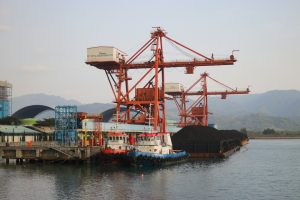Following calls from foreign trading partners, Indonesia has chosen to ease a temporary ban on the export of thermal coal, which it instituted at the start of the month in order to head off widespread power shortages. As Reuters reported, Indonesia yesterday allowed 14 vessels loaded with coal to depart as soon as they secured approvals from the relevant authorities.
“As of today, after seeing a much better supply condition at [state power utility] PLN, 14 vessels that have already been fully loaded with coal and have been paid by the buyers, can be immediately released for export,” Luhut Pandjaitan, the Coordinating Minister of Maritime and Investment Affairs, said in a statement, according to the Reuters report.
On January 1, the Indonesian government announced a ban on thermal coal exports until the end of the month, after supplies at domestic power plants fell to critically low levels, raising the prospect of widespread power shortages and blackouts.
In announcing the move, Luhut said that the government will conduct a review tomorrow and decide whether to end the ban altogether. If it does, he said, it would be phased out gradually in order to ensure compliance with a special rule known as Domestic Market Obligation (DMO).
The DMO obliges coal miners in Indonesia to supply 25 percent of annual production to the domestic market at a price well below current market rates. Most of this goes to domestic power plants run by the state-owned power utility Perusahaan Listrik Negara (PLN), which enjoys a complete monopoly on the transmission and distribution of power. The purpose of the DMO is to override volatility in the international coal markets and ensure a steady supply of low-cost power to the Indonesian public.
The Indonesian government treats the DMO as near-sacrosanct, given the populist benefits that Indonesian governments derive from being able to guarantee a cheap, stable supply of electricity. Earlier this month, President Joko “Jokowi” Widodo even threatened to revoke the export permits of coal firms that failed to fulfill their obligations under the DMO. “This is an absolute rule that must not be violated for any reason,” Jokowi said in a statement on January 3, the news magazine Tempo reported. “If necessary,” he added, “not only do we refuse to issue export permits but also revoke their business licenses.”
But given that Indonesia is the world’s largest exporter of thermal coal – the country exported around 400 million tons in 2020 – this month’s market intervention had an immediate upward impact on the global price of coal. It also prompted protests from industry groups and foreign governments that rely on imports of Indonesian coal to supply their own power plants.
According to Reuters, China, India, Japan, and South Korea together received 73 percent of Indonesian coal exports in 2021. Of these, Japan and South Korea called publicly for Indonesia to ease off on its ban, as did the Philippines.
Early last week, PLN secured an extra 7.5 million tons of coal supplies, which boosted its domestic stockpiles and paved the way to yesterday’s decision to release coal shipments that had been paid for but prevented from leaving port. In his statement, Luhut added that when exports are resumed, Jakarta would ensure that all of PLN’s coal supplies for this year are secured within two weeks in order to minimize the risk of further shortages.
As I noted at the time of the initial imposition of the ban, the political economy of power generation in Indonesia, particularly the power to guarantee cheap electricity to the Indonesian public, poses serious obstacles to the country’s lofty green energy ambitions. The same could well be said by the Asian addiction to coal that was exposed by the Indonesian export ban, which prompted immediate protests from key importers. Clearly, without concerted and forward-looking actions by Asia’s governments, the region’s move away from coal power will be a long and political complex process.

































